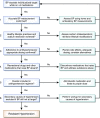Recognition and Management of Resistant Hypertension
- PMID: 27895136
- PMCID: PMC5338706
- DOI: 10.2215/CJN.06180616
Recognition and Management of Resistant Hypertension
Abstract
Despite improvements in hypertension awareness and treatment, 30%-60% of hypertensive patients do not achieve BP targets and subsequently remain at risk for target organ damage. This therapeutic gap is particularly important to nephrologists, who frequently encounter treatment-resistant hypertension in patients with CKD. Data are limited on how best to treat patients with CKD and resistant hypertension, because patients with CKD have historically been excluded from hypertension treatment trials. First, we propose a consistent definition of resistant hypertension as BP levels confirmed by both in-office and out-of-office measurements that exceed appropriate targets while the patient is receiving treatment with at least three antihypertensive medications, including a diuretic, at dosages optimized to provide maximum benefit in the absence of intolerable side effects. Second, we recommend that each patient undergo a standardized, stepwise evaluation to assess adherence to dietary and lifestyle modifications and antihypertensive medications to identify and reduce barriers and discontinue use of substances that may exacerbate hypertension. Patients in whom there is high clinical suspicion should be evaluated for potential secondary causes of hypertension. Evidence-based management of resistant hypertension is discussed with special considerations of the differences in approach to patients with and without CKD, including the specific roles of diuretics and mineralocorticoid receptor antagonists and the current place of emerging therapies, such as renal denervation and baroreceptor stimulation. We endorse use of such a systematic approach to improve recognition and care for this vulnerable patient group that is at high risk for future kidney and cardiovascular events.
Keywords: Antagonists; Antihypertensive Agents; Denervation; Humans; Life Style; Mineralocorticoid Receptor; Pressoreceptors; Renal Insufficiency, Chronic; blood pressure; cardiovascular disease; chronic kidney disease; diuretics; hypertension; kidney; renal denvervation; sodium intake.
Copyright © 2017 by the American Society of Nephrology.
Figures
References
-
- Calhoun DA, Jones D, Textor S, Goff DC, Murphy TP, Toto RD, White A, Cushman WC, White W, Sica D, Ferdinand K, Giles TD, Falkner B, Carey RM; American Heart Association Professional Education Committee : Resistant hypertension: Diagnosis, evaluation, and treatment:A scientific statement from the American Heart Association Professional Education Committee of the Council for High Blood Pressure Research. Circulation 117: e510–e526, 2008 - PubMed
-
- Weitzman D, Chodick G, Shalev V, Grossman C, Grossman E: Prevalence and factors associated with resistant hypertension in a large health maintenance organization in Israel. Hypertension 64: 501–507, 2014 - PubMed
-
- Gifford RW, Jr.: Resistant hypertension. Introduction and definitions. Hypertension 11: II65–II66, 1988 - PubMed
Publication types
MeSH terms
Substances
Supplementary concepts
LinkOut - more resources
Full Text Sources
Other Literature Sources
Medical
Miscellaneous


